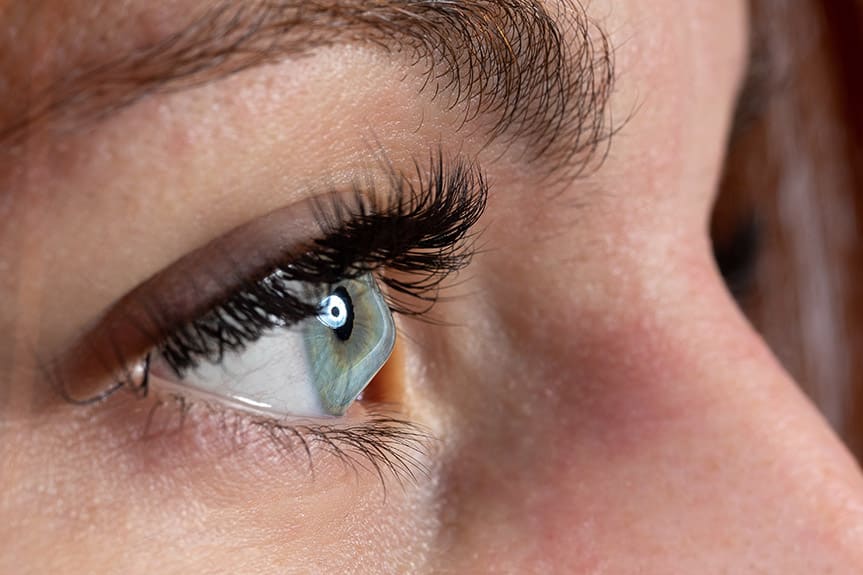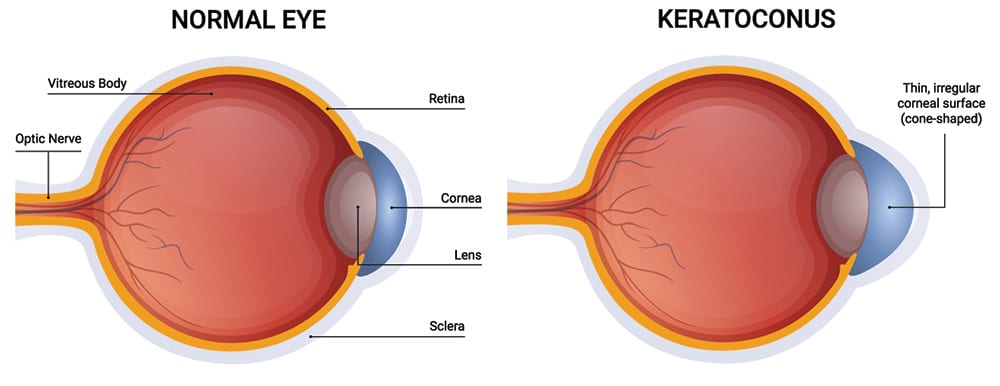Corneal Crosslinking

Have you been diagnosed with keratoconus? Do you want to slow the progression of your condition and preserve your vision? Cape Fear Cataract & Cornea offers corneal crosslinking, a procedure that can help strengthen your cornea and prevent your keratoconus from worsening.
What is Keratoconus?
Keratoconus is an eye condition that occurs most commonly in teens and patients in their 20s and 30s. It happens when the cornea bulges into a cone shape, impacting your vision.
Symptoms of keratoconus include:
- Blurred vision
- Distorted vision
- Light sensitivity
- Increased nearsightedness or astigmatism
- Inability to wear contact lenses
Although eye doctors cannot reverse keratoconus, there are effective treatments available that can stop the progression of the condition, including corneal crosslinking.

What is Corneal Crosslinking?
Corneal crosslinking is a minimally invasive procedure that can strengthen your cornea to treat keratoconus. It works by using a specific wavelength of UV light in combination with riboflavin eye drops to create collagen bonding in the cornea.
Collagen is the structural tissue that makes up the cornea. Corneal crosslinking prevents the corneal steepening associated with keratoconus by creating more collagen bonds to fortify the cornea’s structure.
While it cannot reverse any damage already caused by keratoconus, it can prevent the corneal tissue from thinning and bulging further. Corneal crosslinking is a highly successful procedure, stopping keratoconus progression in over 90% of cases.
What to Expect During Your Corneal Crosslinking Procedure
Your eye surgeon at Cape Fear Cataract & Cornea will begin the procedure by placing numbing drops into your eye. Then, they will remove or loosen the epithelium, or outer layer of your cornea.
Next your eye receives vitamin B2 riboflavin drops for around 30 minutes. Once they have been absorbed, your eye surgeon will focus a special UV light onto your cornea for another 30 minutes, triggering a photochemical reaction that promotes collagen bonding in your cornea.
They will complete the procedure by applying antibiotic and steroid eye drops, then cover your eye with a bandage contact lens. After your procedure, it will likely take 5 to 7 days for the epithelium to grow back.
You may experience symptoms such as eye irritation, discomfort, and light sensitivity. Your vision will gradually improve as you heal, stabilizing around three months after the procedure.
You will be required to attend several follow-up appointments with your eye surgeon to ensure your eye is healing properly.
Who is a Good Candidate for Corneal Crosslinking?
You may be a good candidate for corneal crosslinking if you have mild to moderate keratoconus or other corneal ectasia-related conditions like pellucid marginal degeneration. Your eye doctor at Cape Fear Cataract & Cornea will conduct a thorough consultation with you to determine your candidacy.
You may not be a suitable candidate for corneal crosslinking if you:
- Have corneal scaring that prevents clear vision
- Have certain autoimmune conditions
- Have a history of ocular herpes
- Have extremely thin corneas
- Are pregnant or breastfeeding
Can Corneal Crosslinking Cure Keratoconus?
While there is no cure for keratoconus, the corneal crosslinking procedure can stop the condition from getting worse. This can prevent future vision loss and improve your prognosis.
Slowing or stopping keratoconus can also help delay or avoid more invasive procedures like corneal transplants and help you regain visual stability.
Schedule a Consultation With Dr. Brian Groat or Dr. Justin Needham
Do you want to learn more about treating your keratoconus with corneal crosslinking? Schedule an appointment at Cape Fear Cataract & Cornea in Wilmington, NC, today!
Request an Appointment“Excellent physician! I feel very comfortable with him taking care of my eyes. He is a honest physician. Staff and office is wonderful! I would highly recommend him for all your eye needs!”
“I moved to Wilmington 4 years ago and found Dr. Groat when I had an eye emergency. His precision and efficiency is undeniable. He has an existentive medical background that made me feel comfortable + his team is so sweet, they really made my experience bearable. I’ve been going back every year for eye exams!”


